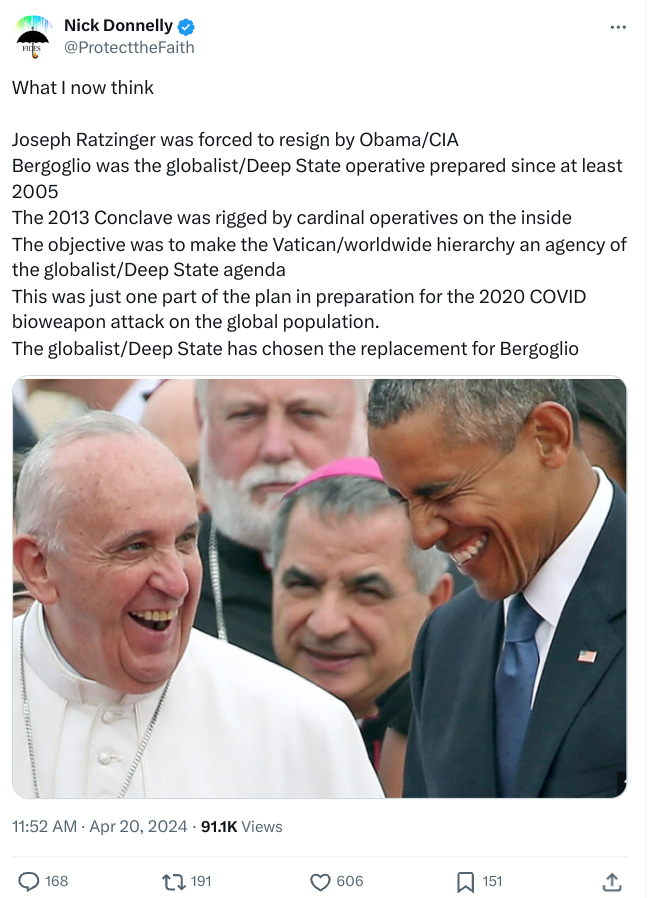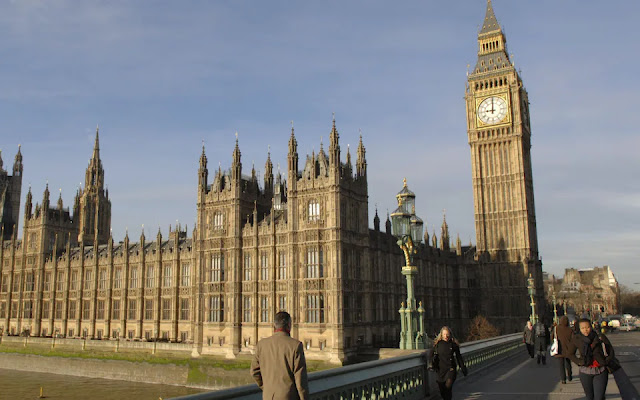Fr. Regis de Cacqueray, SSPX District Superior of France Condemns Pope Francis Message Of Good Wishes To Muslims For The End Of Ramadan - Full Text In English!
St Francis Converting Muslims
For the end of Ramadan and Id al-Fitr, Pope Francis signed with his own hand, on July 10, a message of good wishes [see text below] to the Muslims, to be published on August 2, 2013.
For centuries, after the example of Our Lord, Catholics have been called to show their charity towards their neighbors; this charity is expressed by the most ardent and noble desire, that of seeing them one day receive the greatest of gifts: becoming sons and daughters of Jesus Christ by the grace of baptism. It would thus be a lack of esteem for our neighbor not to hope with all our heart that he may resolutely abandon the obstacles that draw him away from Christ and the Holy Church instituted by Him. Man-made religions, such as Buddhism, Islam or Talmudic Judaism, are among the foremost of these obstacles.
And yet, since Vatican II and its declaration, Nostra Aetate, these obstacles have suddenly come to be seen as worthy of esteem, even as vehicles of grace. While in reality they keep souls from finding the truth and adhering to Christ, the only way of salvation, a good number of pastors now encourage interest in these spiritual systems, and invite non-Christians to deepen their own beliefs. In some cases, they even encourage them to remain in their errors!
When the popes, by their acts, such as kissing the Koran, or by their writings, such as wishing them a happy feast of Id al-Fitr, encourage the Muslims in the practice of Islam, we cannot but be devastated! In doing this they seem to lose sight of souls’ need to leave these paths that do not and can never lead to their salvation.
This attitude is the very opposite of that of St. Francis of Assisi when he met Sultan Al Malik Al Kamil: he gave proof of a demanding charity towards him, showing that he truly understood the man, but desiring only one thing: that his soul might go to Jesus Christ and abandon Islam. He neither insulted nor assaulted him. But neither did he give way. He told him straightforwardly:
If you wish to convert to Christ, and your people with you, I will most gladly remain among you out of love for Him. If you are hesitant about abandoning the law of Mohammed for the faith of Christ, order an immense fire to be lit; I will enter into it with your priests and you will see which is the surer and holier of the two creeds, and which one you must follow.On April 3, 1991, John Paul II sent a message to the Muslims for the end of Ramadan. This August 2, his successor Francis imitated him. These acts are justified by the new practice of friendship inherited from the Council. This practice wishes to respond to the desire of entertaining peaceful relations in the zones of coexistence. But how can we not see that in the regions where Christians and Muslims live, the Christians are never the ones persecuting? How can we not notice that in our Western lands, it is the mosques that are being built and the churches that are being destroyed? How can we not observe that where Islam advances, it is to the detriment of our sanctuaries and calvaries? Is not this growth thanks to an irenicism that has refused prudence and embraced unconsciousness?
Fr. De Foucauld, who lived in contact with the Muslims and whose love for these men knew no bounds, was always lucid in distrusting their erroneous beliefs.[1] Speaking of the Muslims of North Africa, he said:
They can fight with great courage for France, out of a sentiment of honor, a warlike character, a solidarity, a fidelity to their given word, like the mercenaries of the 16th and 17th centuries, but generally speaking, besides some exceptions, as long as they remain Muslim, they will not be French; they will wait more or less patiently for the day of the medhi, when they will drive France to submission.Why should this realistic warning from the holy missionary come to be seen as an exaggerated judgment and a fearful proof of his animosity?
For the love of God, for the love of souls, we pray that the Church’s authorities, and in particular the Sovereign Pontiff, may return to that clear language that consists in showing one’s love for one’s neighbor, but never showing esteem for the errors that can keep him far from God.
As the Apostle of the Gentiles warning St. Peter, we desire in our modest turn to send out a cry of alarm to his successor. May he strengthen souls with the charity of the missionary spirit that can only open a dialogue with the one single idea of resolutely leading souls to Jesus Christ.
There only is their good. There only is their salvation.
Suresnes, August 6, 2013, feast of the Transfiguration of Our Lord.[2]
Fr. Regis de Cacqueray, District Superior of France
Message of Pope Francis on August 2, 2013, for the end of Ramadan
To Muslims throughout the World: It gives me great pleasure to greet you as you celebrate ‘Id al-Fitr’, so concluding the month of Ramadan, dedicated mainly to fasting, prayer and almsgiving. It is a tradition by now that, on this occasion, the Pontifical Council for Interreligious Dialogue sends you a message of good wishes, together with a proposed theme for common reflection.This year, the first of my Pontificate, I have decided to sign this traditional message myself and to send it to you, dear friends, as an expression of esteem and friendship for all Muslims, especially those who are religious leaders. As you all know, when the Cardinals elected me as Bishop of Rome and Universal Pastor of the Catholic Church, I chose the name of “Francis”, a very famous saint who loved God and every human being deeply, to the point of being called “universal brother”. He loved, helped and served the needy, the sick and the poor; he also cared greatly for creation. I am aware that family and social dimensions enjoy a particular prominence for Muslims during this period, and it is worth noting that there are certain parallels in each of these areas with Christian faith and practice.
This year, the theme on which I would like to reflect with you and with all who will read this message is one that concerns both Muslims and Christians: Promoting Mutual Respect through Education. This year’s theme is intended to underline the importance of education in the way we understand each other, built upon the foundation of mutual respect.
“Respect” means an attitude of kindness towards people for whom we have consideration and esteem. “Mutual” means that this is not a one-way process, but something shared by both sides. What we are called to respect in each person is first of all his life, his physical integrity, his dignity and the rights deriving from that dignity, his reputation, his property, his ethnic and cultural identity, his ideas and his political choices. We are therefore called to think, speak and write respectfully of the other, not only in his presence, but always and everywhere, avoiding unfair criticism or defamation. Families, schools, religious teaching and all forms of media have a role to play in achieving this goal.
Turning to mutual respect in interreligious relations, especially between Christians and Muslims, we are called to respect the religion of the other, its teachings, its symbols, its values. Particular respect is due to religious leaders and to places of worship. How painful are attacks on one or other of these! It is clear that, when we show respect for the religion of our neighbors or when we offer them our good wishes on the occasion of a religious celebration, we simply seek to share their joy, without making reference to the content of their religious convictions.
Regarding the education of Muslim and Christian youth, we have to bring up our young people to think and speak respectfully of other religions and their followers, and to avoid ridiculing or denigrating their convictions and practices. We all know that mutual respect is fundamental in any human relationship, especially among people who profess religious belief. In this way, sincere and lasting friendship can grow. When I received the Diplomatic Corps accredited to the Holy See on March 22, 2013, I said: "It is not possible to establish true links with God, while ignoring other people. Hence it is important to intensify dialogue among the various religions, and I am thinking particularly of dialogue with Islam. At the Mass marking the beginning of my ministry, I greatly appreciated the presence of so many civil and religious leaders from the Islamic world." With these words, I wished to emphasize once more the great importance of dialogue and cooperation among believers, in particular Christians and Muslims, and the need for it to be enhanced. With these sentiments, I reiterate my hope that all Christians and Muslims may be true promoters of mutual respect and friendship, in particular through education.
Finally, I send you my prayerful good wishes, that your lives may glorify the Almighty and give joy to those around you. Happy Feast to you all!
From the Vatican,
July 10, 2013
Francis
Footnotes
1 Concerning Fr. De Foucauld, read The Necessity and Absolute Urgency of Converting the Muslims to Catholicism.
2 The feast of the Transfiguration of Jesus had for a long time been celebrated on August 6 in different churches of the East and the West. In commemoration of the victory that stopped the invading fleet of Islam near Belgrade in 1457, since the news of this victory reached Rome on August 6, Pope Calixtus III expanded this solemnity to the universal Church. Pius X raised it to the rank of a double of the 2nd class because the basilica of St. John Lateran, anciently consecrated to the Holy Savior, celebrates its feast twice: on Easter (the Redeemer) and on August 6 (the transfigured Savior). The other churches dedicated to the Holy Savior celebrate their feast either on Easter or on the feast of the Transfiguration.








Comments
Post a Comment